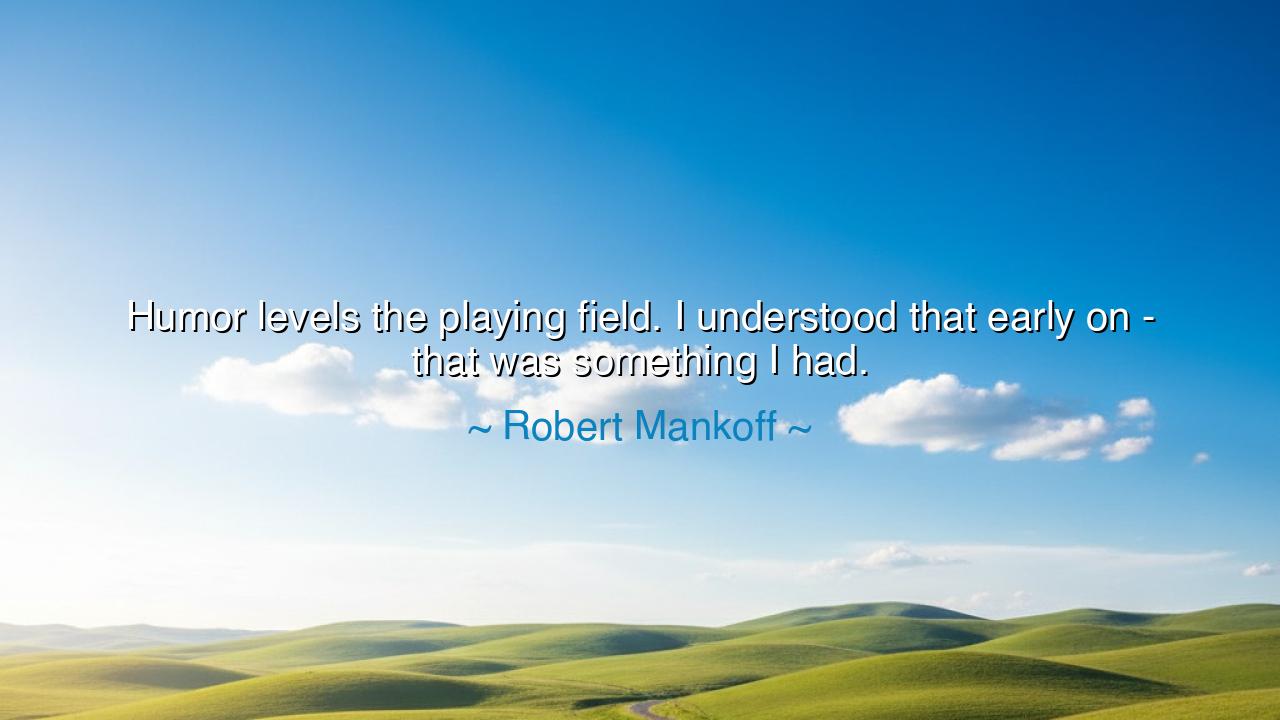
Humor levels the playing field. I understood that early on - that






In the grand theater of life, where the tides of fate roll unpredictably and where each of us takes a turn on the stage, there exists a powerful force—a force that levels the playing field and unites us in our shared humanity. This force is humor, a gift that transcends the barriers of wealth, status, and power. Robert Mankoff, in his simple but profound reflection, shares a truth that has echoed through the corridors of time: "Humor levels the playing field. I understood that early on—that was something I had." This insight, though expressed in modern language, captures a timeless wisdom about the transformative power of humor, which, like a cleaver, can break down the walls that divide us and reveal our commonality.
The ancients knew well that humor was not merely a tool for entertainment, but a powerful equalizer. In the ancient Greek world, where status and rank often determined a person's worth, the great playwright Aristophanes used comedy to subvert the social hierarchies of his time. His satirical plays, filled with biting humor, mocked the powerful, bringing philosophers, politicians, and even the gods themselves down to a more human level. Aristophanes' humor levelled the playing field by making the elite—no matter how high their position—vulnerable to the same mockery that the common man could endure. Through humor, he revealed the absurdities of the world and showed that no one, regardless of their station, was above the ridicule that humor so often brings.
Consider also the great philosophers of antiquity, like Socrates, whose method of questioning was often as humorous as it was profound. Socrates, though a revered figure, used irony and humor to break down the pretensions of those around him. His ironic questioning was a way of showing that no matter how powerful or learned someone might be, they were still vulnerable to the truths that humor could reveal. Socrates understood that humor, in its purest form, levels the playing field between the wise and the ignorant, the rich and the poor. It is a weapon that exposes all human beings to the same light, regardless of their outward circumstances.
Humor's role in leveling the playing field is not limited to the philosophers or playwrights of ancient times. In Shakespeare’s The Twelfth Night, the character of Feste, the fool, has the power to speak truths that no one else dares utter. He is a humble jester, but through his wit, he challenges the nobility, often revealing the absurdity of their power and privilege. In Feste’s world, humor is a way of equalizing—his jests cut through the formalities of rank, and in their sharpness, they reveal that all men, whether kings or servants, share in the foolishness of the human condition. Much like Mankoff’s insight into humor, Shakespeare shows that humor is not simply about laughter, but about truth—truth that can be heard by all, regardless of their position.
The lesson here is profound: humor is a gift that equalizes. It reminds us that no matter how high we rise or how deep we fall, we are all part of the same human family. In a world that often seeks to divide us through status, wealth, or power, humor allows us to find common ground. Mankoff’s statement reflects the truth that humor is not a frivolous thing—it is a means of connection, a force that reminds us of our shared humanity. When we laugh together, we are not separate individuals, but a collective whole, united by the same absurdities of life.
Let us consider how we, too, might use humor to level the playing field in our own lives. When we encounter those who seem to stand above us, whether in our work, our relationships, or our social circles, let us not be intimidated by their position. Instead, let us use the subtle power of humor to reveal the shared humanity we all possess. Let us use laughter not to mock or diminish, but to equalize, to bring everyone down to the same level, to remind us that no one is beyond the reach of life's absurdities.
In embracing this wisdom, we can take practical action: when faced with conflict or tension, let us not resort to division or pride, but seek to find the humor in the situation. Let us laugh at the absurdities that divide us, and in doing so, we will discover a path to unity. For in the end, as Mankoff wisely observes, humor does not just make us laugh—it makes us human. It reveals our shared flaws, our insecurities, and our joys, and through that shared understanding, we are brought closer together, no matter our station in life.






AAdministratorAdministrator
Welcome, honored guests. Please leave a comment, we will respond soon